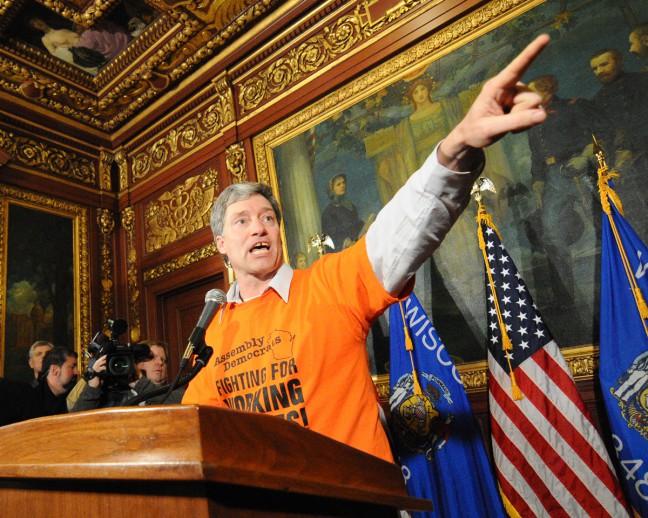Despite protests from one missing senator over telephone, a committee approved an amended bill Tuesday that requires citizens to show photo identification in order to vote in elections.
The committee did mark Sen. Jon Erpenbach, D-Middleton, one of the fourteen senators that fled Wisconsin last Thursday in an effort to botch proceedings on the budget repair bill, as present after he phoned in for roll call. But Senate Committee on Transportation and Elections chairperson Sen. Mary Lazich, R-New Berlin, did not let Erpenbach vote on the Voter ID bill being amended, he said.
“They allowed roll call but refused to let me vote. She didn’t give an excuse that made sense,” Erpenbach said.
The missing senators had been participating in committee meetings since they left via phone, and phone calls are standard and acceptable procedure whenever any senator is unable to attend a committee meeting in person. Lazich has phoned into committee several times in the past, including when she was on vacation, Erpenbach said.
Lazich said Erpenbach had no right to vote on the Voter ID bill because he was ignoring the Senate’s call of the house – the procedure used to bring missing senators to the chamber. Erpenbach’s name did not get called when the committee voted, and the amended bill passed with three votes for and no votes against, according to the Associated Press.
Voter ID is particularly important to Erpenbach. Monday night he participated, along with other experts in election issues, in a panel discussion over the phone about Voter ID and its effects.
“We don’t have election fraud problems in Wisconsin,” Erpenbach said over speakerphone Monday night. “We have less than a handful of fraud cases. This legislation would make it difficult for members of society to vote.”
Currently, a Wisconsin citizen does not need to show poll workers an ID in to vote.
Democrats have long criticized the Republican backed Voter ID bill as a way for conservatives to make it harder for marginalized citizens in Wisconsin, like minority groups, students, the elderly and disabled, to vote. Republicans believe one case of fraud is one too many and would like to increase voter confidence with election results.
The committee’s amendment does increase the acceptable number of IDs a voter can use to prove citizenship. Passports and tribal IDs were added, and other forms of acceptable ID include a driver’s license, a military identification card, state identification card or birth certificate.
The amendment also increases the amount of time a citizen must be a resident of the district he or she votes in from 10 to 28 days before an election.
If passed, the new rules would take effect as early as April 1, within days of the spring elections. But the law takes full effect in 2012, and citizens without IDs this spring would be allowed to vote.
The committee in charge of organizing the Senate’s calendar scheduled Voter ID to be heard on the floor Thursday, Senate Majority Leader Scott Fitzgerald’s, R-Juneau, spokesman, Andrew Welhouse, said.
However, the 14 Democratic senators’ absences prevent the Senate from voting on the Voter ID bill because it has fiscal components to it, which require at least 20 senators to be present.














